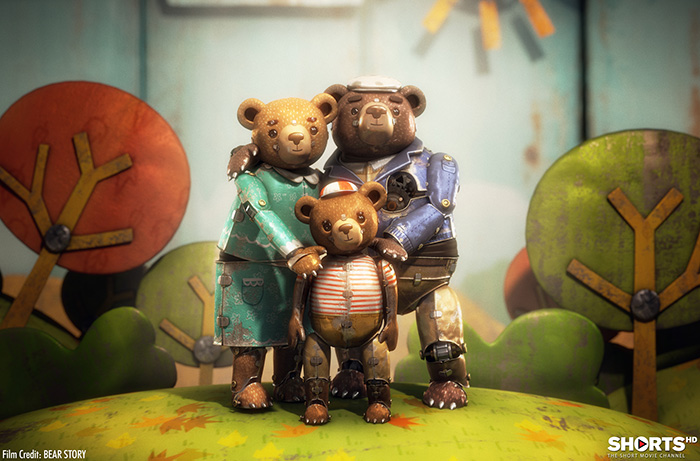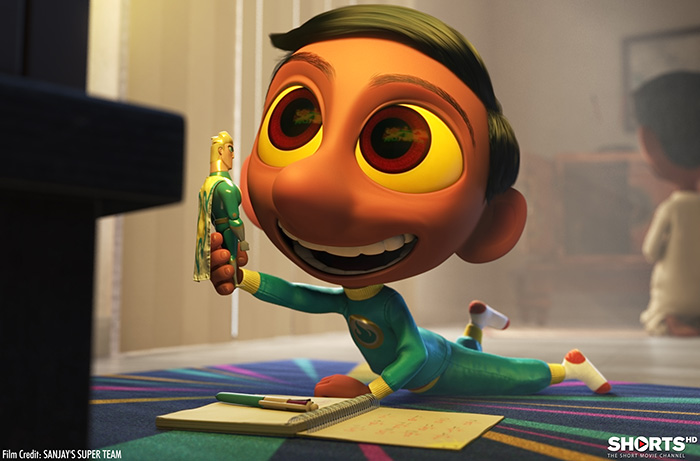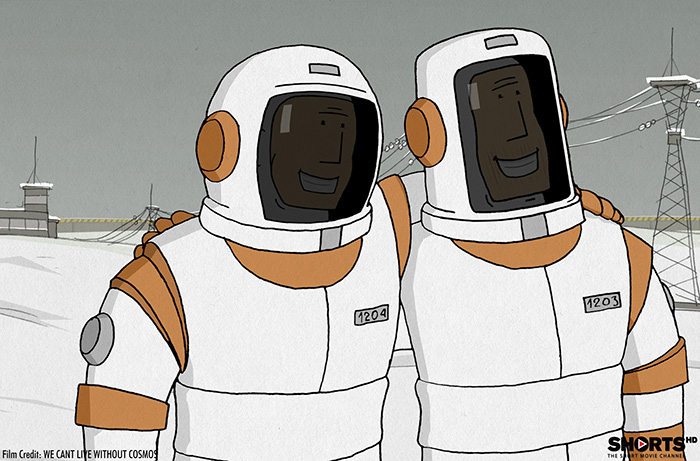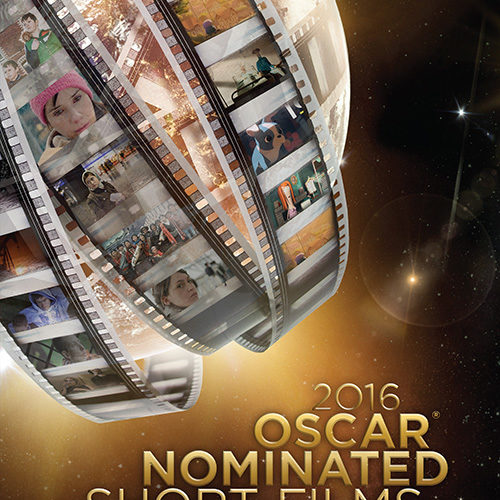Ahead of the Academy Awards, we’re reviewing each short category. See the Animation section below and the other shorts sections here.

Bear Story [Historia de un oso] – Chile – 11 minutes
While Gabriel Osorio Vargas‘ Chilean short film Bear Story tells the tale of a sad, lonely old bear, it does ultimately prove uplifting. Here’s a creature tinkering tirelessly in his shop to put the finishing touches on what could very well be his life’s work and yet any and all success or failure is met with silence. There’s no one else in his small home to celebrate or lament—just the indentations of two bodies on his mattress permanently displaying that love and company existed not too long ago. How did it come to this? We’ll never know and that’s a wonderful thing. Instead we discover that love’s strength—strong enough to render distance and death harmless. His heart’s with her wherever she might be.
We could talk about the logistics of what follows inside the bear’s mechanical diorama all day and pick apart how what’s shown is impossible—the figures moving by themselves in specific positions despite not being on tracks and the zoom ins and outs changing vantage points with cuts that cannot occur in reality—but that only ignores the message beneath the animation. It’s okay to merely bask in the glory of Vargas and his Punkrobot Studio unfolding their story of a bear’s life via metal figures and gear-run sets attached by tiny hinges folding in perfect synchronicity. This secondary aesthetic contrasts their real world look nicely so we know when we’re inside Bear’s box. And they pull no punches—no matter how scary—to relay his tragic history.
The film’s dark enough to fear what might become of the small cub that approached Bear’s street performance stage with coins and a smile. It’s practically the SS rounding up lambs to slaughter during the Holocaust as told through the filter of the animal kingdom being caged for humanity’s entertainment. Thankfully, however, Vargas never cuts to the tiny bear’s reaction because we’d see tears and shock if not his retreat to dad in abject fright. We know the show won’t end as tragically as it begins due to the mattress impression, but that hardly lessens the emotional wallop. And after everything’s said and done, we can’t help wanting to call home and hold those we love close because every second is precious. Never let go.
B

Prologue – UK – 6 minutes
I wasn’t sure what I was watching once Richard Williams‘ Prologue moved past its carefully drawn flower pollinated by a bee and a butterfly soaring across the screen to wipe the page clean before introducing the sharp eyes of soldiers. Their shields and spears conjured thoughts of Sparta; the lack of clothing on the men a character study of anatomy. To me there seemed no purpose other than that: to show the human body engaged in warfare to brutal effect. But then a little girl is seen, her innocence lost in an instant. It’s this detail that gives clarity to its story albeit one of which I was unfamiliar. Thankfully the press notes explain it as an incident during the Spartan-Athenian wars some 2,400 years ago.
Is that bit of history crucial to appreciating what Williams has accomplished? Not at all. If anything it distracts from the simple beauty of the animator’s work—the short proving an almost never-ending challenge to complete in his down time amidst other projects. To think that its six-minutes consists solely of hand-drawn frames in colored pencil is astounding. Williams knows it too as he begins the journey with a vertical pan up from a pile of pencil nubs past a tower of pages bundled together in sections. This shot gives literal weight to the process and medium itself by making visible just what animation involves. We aren’t watching pixels. Prologue is blood, sweat, and tears scratched one stroke at a time with meticulous detail.
What’s more are its cinematic sensibilities. The way Williams moves the “camera” to spin around a leaf or a warrior catching his breath before being impaled must have taken years to plan. I want to see the stack of pages rejected since some sequences defy imagination. He must have flipped the pages back and forth only to notice the angle was wrong some of the time. This work ethic to stay true to what’s an archaic method deserves his Oscar nomination alone. The fact his brief look at the carnage of four men devoid of remorse moves forward with malice and a black finality simply bolsters its pedigree. Leave the kids at home, though. Its keen look at mankind’s darkness tainting the purity of hope is relentless.
B+

Sanjay’s Super Team – USA – 7 minutes
Sunday school would be a must-attend for kids of every religion if their church, synagogue, mosque, or temple put a fun, pop culture spin on their Gods—guaranteed. How badass would it be to watch a cartoon Jesus using his magic to raise people from the clutches of the evil Grim Reaper? Sure Islam would be tougher considering you can’t depict Mohammad, but there’s surely ways around that. If it’s good enough for the Greeks with Thor, Hercules, and everyone else Marvel/DC has reappropriated, it should be good enough for the pious looking to bolster their ranks. Religion is a tough sell to a kid with television, gaming systems, and the internet at his/her disposal. Just look at little Sanjay Patel ignoring his morning prayers.
Inspired by his own childhood in San Bernardino as an Indian American who gravitated towards western entertainment while his parents worked to instill Hindu values, Sanjay’s Super Team wonderfully depicts the infinite possibilities held by our imaginations. Frustrated that his father would dare ring his prayer bell while his favorite cartoon was airing on TV, the two wage a volume war until Dad finally turns the set off. Sanjay is therefore relegated to begrudgingly sidling over to the family shrine for solemnity like he’s been taught. Today is different, though. Today he looks at Vishnu, Durga, and Hanuman and sees a parallel with the superheroes he adores. What if the nefarious morphing villain of cartoon infiltrated their sanctuary? Can these Gods prove to Sanjay that they’re legitimate heroes?
You bet they can. Transported from the gorgeously exaggerated 3D polish of the real world comes a brightly colored 2D extravaganza of side-scrolling fighting glory. On one side is the multi-headed monster readying to destroy everything and on the other are the avatars Sanjay has been learning about with himself caught in the middle. The action is fast and over-the-top with the candle flame and bell of ceremony playing a role in the make-believe. Suddenly stone carving and quiet chanting turns from a chore to an adventure and this wide-eyed boy evolves from dismissing his own heritage for homogenization to merging his dual worlds into one. While everyone across seven continents has America’s Superman in view, Sanjay realizes his Gods are just as amazing and uniquely his own.
A-

We Can’t Live Without Cosmos – Russia – 16 minutes
The title may be We Can’t Live Without Cosmos, but the thing Konstantin Bronzit shows we really can’t live without is love. I don’t mean romantic love either; I mean the bond between two human beings whether by blood or not. A kinship like what’s cultivated in the military wherein soldiers come home brothers despite leaving as strangers. To find someone to confide in and follow hand-in-hand through life no matter age, trajectory, or location isn’t something to take lightly. For many a friend may in fact be closer than family (unless someone fills both roles) because an outside perspective is invaluable. Friends know you and your potential to help drive you towards your dreams without expectations. Friends supply hope.
This is what the two cosmonauts at the center of Bronzit’s short give as they propel themselves forward within Russia’s space program, striving to fill the two suits awaiting the nation’s latest mission beyond our atmosphere. They literally breathe the cosmos with every breath, stay strong with every test measuring their endurance and constitution, and fall asleep to the pages of their favorite book about space. They jump on their beds despite being grown men because each bounce gets them closer to their ultimate goal. And with every check mark by their instructor we know they’ll be the ones donning helmets. With that certainty, however, comes the trepidation of what will go wrong. Every story needs conflict and this one provides the potential for devastating revelations.
As though it’s not bad enough when the first shoe drops, Bronzit hits us again with an emotional gut-punch showing exactly how close these men are and will be no matter what transpires. The short has its moments of dry levity, but they pale in comparison to those of impactful humanity. We empathize with their initial plight even if they seem unfazed—our sorrow not shared by the cosmonauts because what we see as “unfair” isn’t when the result is a known commodity. The next hiccup, however, is as heartbreaking for us as those onscreen, its aftermath turning spiritual as emotions transcend the physical and we witness the purity of their love. With friends, one’s success is shared. And if one falls, the other will never be the same.
B+

World of Tomorrow – USA – 17 minutes
Animator/writer/director Don Hertzfeldt includes a wealth of philosophically introspective gems within his latest sci-fi short World of Tomorrow. None, however, is more poignant than: “That is the thing about the present, Emily Prime. You only appreciate it when it is the past.” Truer words have never been spoken because so many of our greatest moments prove mere blips on our radar upon occurring. Those we celebrate like earning a promotion or winning the big game are fleeting and ultimately meaningless in context with who we are and what defines us. But because we embraced them so fervently, they stick while many others fade away. As death looms, though, memories alongside those we loved become that which we hope to relive one more time.
It’s the simple moments like walking with our parents as children—quiet times recalling the security, comfort, joy, and love when optimism and a happily ever after still seemed possible. But even those who achieve happiness will always have regret. Living a good life doesn’t extinguish our yearning for the youthful innocence we know we can never retrieve. This is why Third Generation Emily (Julia Pott) has used her Earth’s technology almost three centuries in the future to reach backwards and speak with the version of herself that began her existence. Emily Prime (Winona Mae) might be a child with more words in her head than her brain can cognitively parse, but she experienced those moments her clone covets on the eve of destruction.
The film’s conceit is stunning as the mouths of babes literally prove mankind’s salvation. I don’t mean that as in the continuation of our species or as though Prime’s gibberish holds a key to overcoming whatever apocalyptic event shrouds 3rd Gen’s world. Prime is utilized as a mirror of sorts looking into our souls to find what really matters. This youthful Emily is so far removed from the clone she will eventually help create that her day-to-day’s highlights include eating lunch and showing off her toy cars to interested strangers. Whether she holds a specific recollection for 3rd Gen to go through all this trouble or not, just seeing her original body possessed by a real human consciousness can be inspiring enough.
Hertzfeldt’s world is so driven by immortality that it has become a plastic existence without reality. Clones are all that are left—monotone, robotic, and devoid of the emotional spectrum that makes us human. They fall in love with inanimate objects; they exist because of false consciousness. Strip away their memories and they are just empty vessels of biological resources aging until death without a thought. And when something does spark to rekindle feelings long since dormant, it barely registers as more than a fact to be proud of rather than an event to aspire towards. There will be no revolution because the clones removed three generations or more from humanity know nothing but their programming. Live, birth a clone, die, repeat.
So the animation—Hertzfeldt’s first foray into the digital sector along with his The Simpsons cold open—can be crude line drawings and yet appear three-dimensional at the same time. We can laugh as Prime rambles and manipulates her future’s Outranet by yelling colors because it is cute and wholesome and untainted by the jadedness of adulthood or the matter-of-factness 3rd Gen’s memory provides. We feel sad for 3rd Gen’s impending demise not because she will be no more, but because the one thing she wishes to re-experience has left her. We retreat inside ourselves and try to pinpoint what we’d want to grab ahold of in our own last breath: a face, a laugh, or perhaps the touch of someone long since gone.
The Word of Tomorrow is therefore nothing without the here and now. Those beings may look like us and know all we know, but our essence cannot endure. And that’s okay. Our mortality affords the ability to live to the fullest knowing it will come to a close without warning. Would you want to upload your consciousness to a cube hoping it finds a shoddy robot or cloned body awaiting programming? I wouldn’t. I’d rather be myself and the experiences I enjoyed, hated, and resigned myself to live. While today may be the day I speak to myself at world’s end, it won’t necessarily be a sad occasion. Prime met a kind woman who took her on an adventure. Whether dream or reality: it made Prime feel alive.
A+
The Oscar Nominated Shorts are in limited theatrical release starting January 29th. See the official site for more details and our reviews of the other shorts sections here.

